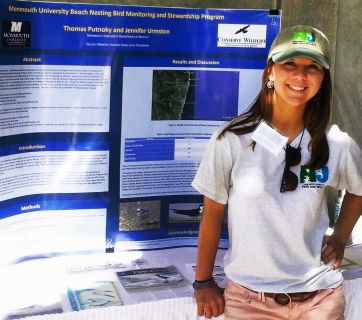Jenn grew up in the Hudson Valley region of New York
with a family who encouraged her to spend time outside
in nature. Her love for the ocean began at a young
age, stemming from family trips to Acadia National
Park where she enjoyed exploring tidal pools and testing
her limits in the frigid water. Curious by nature,
her parents struggled to take her on hikes as a child
because she would (and still does) stop to look at
every interesting rock, stick, leaf, or flower.
To further explore her interest in the ocean, Jenn
attended Monmouth University in New Jersey where she
obtained a Bachelor's degree in Marine and Environmental
Biology and Policy. In January, 2015, she studied
abroad at the Cape Eleuthera Institute in the Bahamas
where she worked on research projects including shark
bycatch, Queen Conch conservation, and Piping Plover
migrations.
The following summer, she interned with the NJ Division
of Fish and Wildlife as and endangered shorebird monitor,
where she worked to protect Piping Plovers and other
endangered shorebirds. She enjoyed combining conservation
research with public outreach and worked passionately
to educate beachgoers on the importance of protecting
the endangered birds.
Taking a special interest in experimental design
and analysis, Jenn decided to take on a minor in Statistics.
She worked as a statistical consultant at Monmouth,
analyzing and interpreting data for clients in the
Biology department. In her final semester of college,
she designed and conducted an original experiment
on New Jersey maritime forests, using dendrochronology
to analyze trends in the growth of Pitch Pines related
to climactic variables. She maintains her interest
in coastal forests, but is excited to return to bird
research!
After graduation, Jenn took a year to work as an
environmental educator, but quickly realized that
she wanted to go back to school. She never imagined
she would end up in the beautiful state of Hawaii,
but when she came across Dr. Hyrenbach's seabird research,
and his special interest in statistics, she knew she
had to be a part of it.
Jenn's research focussed on developing a predictive
model of wedge-tailed shearwater fallout during the
fledging season, in response to anthropogenic light
pollution and environmental drivers.
To learn more about this project, please see below:

Jenn defended her M.S. thesis on October 29, 2020
and graduated.


